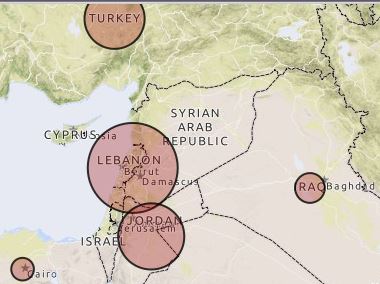As you may remember, the Scripps National Spelling Bee in the United States stirred up a storm in a soup pot when it asked contestants for the one correct English spelling of the Yiddish word for matzah balls. The Scripps spelling czars, working from Webster’s Third New International Dictionary, said the word must be spelled knaidel and only knaidel. The YIVO Institute For Jewish Research said that the proper spelling, as per YIVO’s transliteration method, is kneydl.
The New York Times, misreporting on the fuss, said that “historically,” YIVO’s spelling was the “preferred” one. The Times didn’t say who preferred it, besides the mavens at YIVO. Asserting that there’s just one right way to write a Yiddish word in English, as I tweeted at the time, requires chutzpah, or hutzpa, or maybe ħutzpah, or perhaps hutzpah.
My 140 characters eventually reached my son, somewhere in the Himalayas. He wrote back (with a laptop on which he needed to make some small substitutions in the international phonetic alphabet):
Yehonatan Avraham Gorenberg
Besides the absurdity of putting this word in the spelling bee, there are a few points that YIVO seems to have missed:
The general point: Precise transliteration is impossible because languages are different phonetically and alphabets vary in their use of the letters. The international phonetic sign for Hebrew’s fricative kaf is the Greek letter chei, almost identical to x. If we used x to transliterate the Hebrew sound, native English readers would read it as ks. But x is useful for transliterating the latter consonant combination, which is common in Greek and Nepali (Sanskrit ksh). In old Spanish and Malti (and sometimes in Portuguese), x is used for sh. If we use ch for the fricative kaf, we cause the reader to confuse it with an existing English sound. Yet this is the most common transliteration. If we use kh, we create confusion with transliterations of Tibetan and Indian languages, in which the sound k+h is common. In fact, that was apparently the classical Greek value of chei in the first place.
The obvious Jewish point: Hebrew words are a large component of high-register Yiddish, and of Yiddish in general. Yiddish has indeed affected the pronunciation of these words in American English. However, transliteration is often based on the original Hebrew, especially with religious terms. So even if Americans Jews say xa:nikə (or some, ha:nikə),
Read more




 Sidney Rittenberg’s face fills the screen in a college auditorium where The Revolutionary is being shown. His eyebrows are bold brushstrokes of white above narrowed, intent eyes. His lips are firm. He has the wrinkles and gnarled neck of an old man. He does not, however, look like a man who is 90 years old, or like one battered by spending 16 of those years in solitary confinement in China for the offense, ultimately, of believing too deeply in the Party and the revolution. “If you put one drop into the long river of human history, that’s immortal … You either make a difference or you don’t make a difference,” Rittenberg says to the camera in his Southern gentleman’s drawl. This is his credo. Outside the auditorium windows, night has fallen. Rittenberg’s larger-than-life face is reflected, translucent, in the glass, as if his memory were speaking out of the darkness. “History,” he says wryly, “rolled right over me.”
Sidney Rittenberg’s face fills the screen in a college auditorium where The Revolutionary is being shown. His eyebrows are bold brushstrokes of white above narrowed, intent eyes. His lips are firm. He has the wrinkles and gnarled neck of an old man. He does not, however, look like a man who is 90 years old, or like one battered by spending 16 of those years in solitary confinement in China for the offense, ultimately, of believing too deeply in the Party and the revolution. “If you put one drop into the long river of human history, that’s immortal … You either make a difference or you don’t make a difference,” Rittenberg says to the camera in his Southern gentleman’s drawl. This is his credo. Outside the auditorium windows, night has fallen. Rittenberg’s larger-than-life face is reflected, translucent, in the glass, as if his memory were speaking out of the darkness. “History,” he says wryly, “rolled right over me.”





